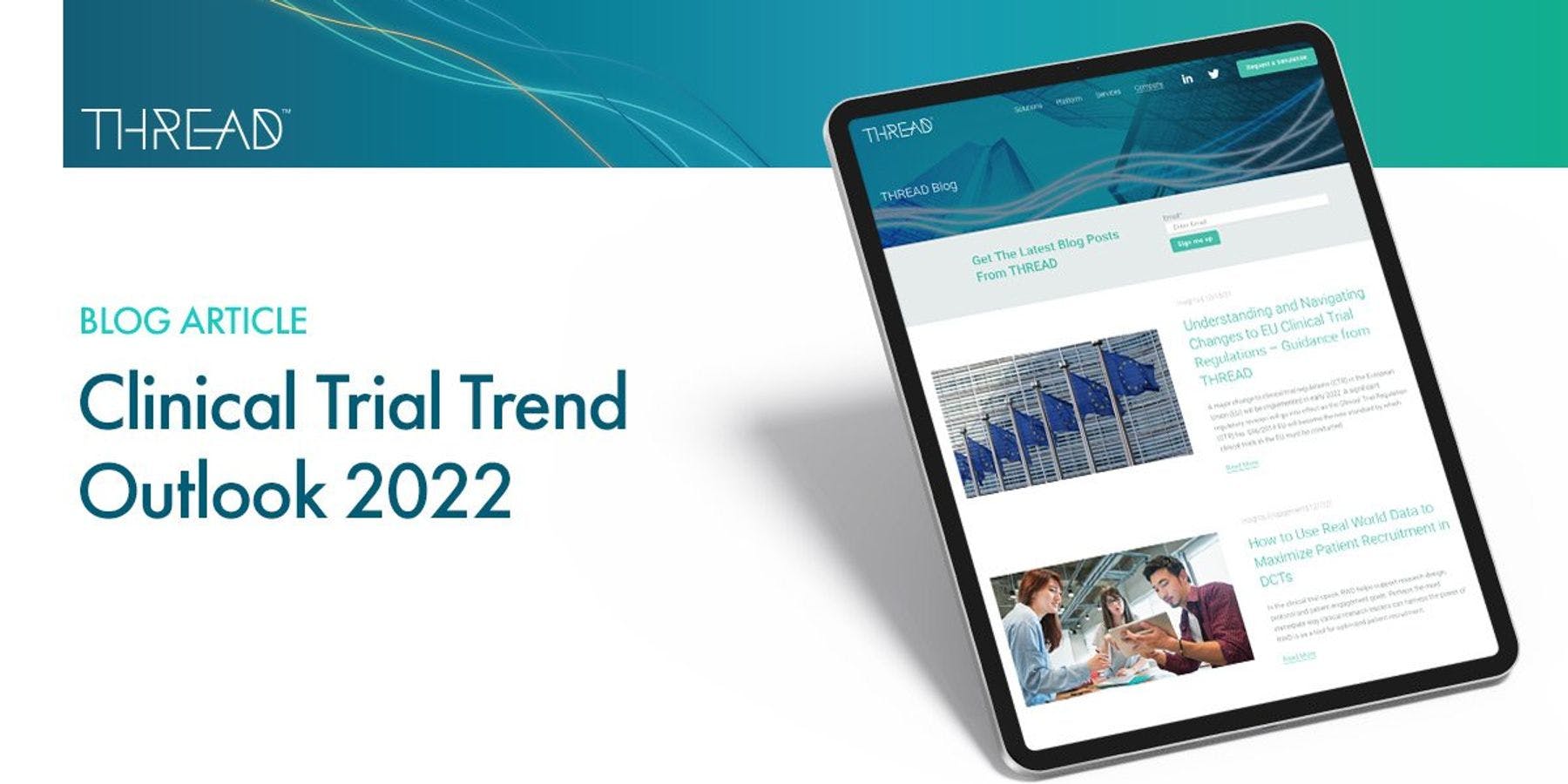Clinical Trial Trend Outlook 2022

The new hybrid standard of clinical trials
The global clinical research industry is expected to increase exponentially in the coming years. With rapid growth and shifting trends it is critical that sponsors, CROs, sites and researchers have a clear focus on trends that will impact the evolving trial landscape. Chief among emerging themes is that hybrid decentralized research approaches are expected to move closer to the standard in 2022. According to John Reites, CEO of THREAD, most future trials will leverage the hybrid model in which some visits and interactions occur at traditional sites while others are moved to virtual visits or home health in a participant's home. Reites was one industry leader that recently spoke with Morning Consult on trends in the space. “Hybrid decentralized studies is what’s really moving the needle in the industry,” Reites said. “That makes it easier for people to participate, but equally makes it easier for sites, because sites are not going away.”
This increase in hybrid and decentralized clinical trial (DCT) activity is not monolithic but segmented by phase and therapeutic area. Phase II, phase III and postmarketing surveillance trials are expected to see the largest growth, while phase I trials will remain at 2021 levels. DCTs are expected to increase across all therapeutic areas, but oncology, rare diseases, central nervous system, and immunology studies are set to lead the growth curve. With this data as a backdrop, there are three (3) other significant trends to watch over the upcoming year.
Increased Reliance on eCOA to Recreate the In-Person Experience
With the right tools, DCTs allow for remote data collection that not only enhances analytics, but also reduces the need for in-person clinical visits. While electronic patient reported outcomes (ePROs), mostly in the form of validated surveys, have been used for decades, there is a distinct rise in more sophisticated, complex eCOA that involve clinicians assessments, performance assessments and sensors. The advent of ubiquitous advanced video communication features and the comfort of the global population with video-driven telehealth visits collectively change the remote data-collection landscape. Technological advancement combined with broad popular uptake enables sponsors and CROs to expand clinical research opportunities beyond historic geographic boundaries. eCOA, combined with specialized telehealth platforms, can digitally recreate much of the experience patients have traditionally gotten from visiting a clinic during a research study. For example, using the video and audio recording capabilities of a standard handheld device enables assessments of participant movement and vocal characteristics to be documented remotely. Learn more about how deploying a comprehensive eCOA solution can enhance your DCT and overall trial success in our report Perspectives and Guidance for Effective eCOA in Global DCTs.
Greater Participant Diversity Will Provide More Meaningful Insights
Decentralized clinical trials (DCTs) are becoming a key opportunity to increase diversity in patient populations and, as a result, expand the options for inclusive, global health outcomes. According to a report from the National Academies of Sciences Engineering and Medicine, DCTs may help increase trial access especially for women, those living in rural areas and racial groups traditionally underrepresented in clinical research. This expansion will enable researchers to garner better insights into population-level data on a global scale. Further aiding data driven insights is the increase of AI technologies that identify the right mix of patients for a specific study, including dynamic incorporation of diversity metrics. The result is a more diverse and tailored list of potential participants, derived from a larger population pool and delivered directly to researchers driving expedited enrollment rates.
DCTs Will Be Leveraged to Reduce Study Costs at Scale
The life sciences industry is realizing one of the most direct ways to reduce study costs is to deploy remote and hybrid decentralized designs at scale (i.e. utilizing repeatable approaches with more than 5 studies) when possible. For example, telehealth visits can cost as much as 50% less than in-person clinical visits for sponsors. Magnify those savings across all studies and DCTs’ impact on the bottom line is available. However, the potential benefits have rarely been fully realized as organizations learn how to effectively implement DCT elements and deliver into protocols. Decreased bottom line will be best realized across a pipeline and not a first-of-its-kind study. But direct cost isn’t the only gain, other savings associated with a decentralized approach include the ability to quickly scale studies globally and DCT solutions that operate on a single platform for study-specific and feature-level configurations. This is not just about the sponsor’s bottom line. Participants and Sites in decentralized trials benefit from reduced travel burden and costs, making DCT participation easier and lead to improved recruitment and retention metrics. Learn more about how to leverage this trend in our report 5 Ways That Decentralized Clinical Trial Approaches Can Reduce Study Costs.
2022 Will Be The Year of Hybrid Pipelines
The elements of decentralized research approaches have been developed over the last years. The pandemic required significant, rapid implementation in both new and ongoing studies of DCT practices. In 2022, we will see the lessons learned from the last two (2) years incorporated into strategies to utilize DCT elements in hybrid studies across sponsor pipelines. There will be numerous hybrid studies, but also developmental pipelines that contain traditional and hybrid decentralized study designs. The push for expansive eCOA strategies and validated remote assessments, inclusive study design and enrollment practices, improved data collection at reduced costs, and streamlined participant and site experience will be major trends this year.
Noah Goodson, Ph.D.
Associate Director, Consulting, THREAD
Noah is well versed in the complex needs of these organizations and has spent significant time in guiding business development and scientific communication strategies with investors. As part of THREAD Consulting, Noah applies practical experience in running trials with a decentralized approach to build more efficient and inclusive studies.